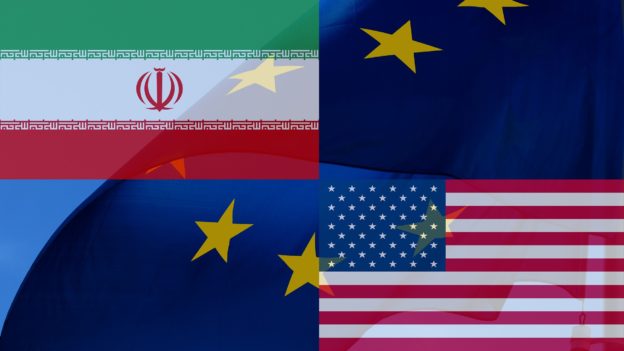Reminder: on 16 January 2016, the United Nations, the European Union (EU) and the United States (US) lifted nuclear-related economic and financial sanctions against Iran. This decision came after the International Atomic Energy Agency confirmed Iran’s implementation of the commitments contained in the Joint Comprehensive Plan of Action (JCPOA).
This plan, concluded on 14 July 2015 together by Iran, the five permanent members of the UN Security Council, Germany and the EU, provides for the suspension of sanctions against Iran in exchange for its commitment to cease all nuclear proliferation activities.
On 8 May 2018, President Trump decided to cease the US participation in the JCPOA. This withdrawal led to a wide-ranging reinstatement of previously lifted US sanctions on Iran, including secondary ones. On 10 January 2020, the US imposed additional sanctions on Iran.
In the wake of the reinstatement of US sanctions, Iran has, since 2019, suspended its JCPOA commitments and announced on 23 February 2021 the suspension of the provisional application of the Additional Protocol as well as additional transparency provisions under the JCPOA.
(1) Resumption of JCPOA negotiations: towards a lifting of US sanctions against Iran?
Faced with this situation, described as « deeply worrying» by the High Representative of the EU, Josep Borrell, the Joint Commission of the JCPOA resumed its work on 6 April 2021 in Vienna, for a possible return of the US and the effective implementation of the JCPOA. This Joint Commission is chaired by the EEAS Political Director Enrique Mora and is attended by representatives of China, France, Germany, Russia, the United Kingdom and Iran.
The discussions held between the JCPOA participants and the US have a dual objective for which two groups of experts are dedicated: the lifting of US sanctions and Iran’s return to full JCPOA implementation. The Joint Commission, which met again on 9 April 2021, tasked the expert groups to pursue their work and agreed to reconvene in the coming days.
In light of the joint ministerial statement of 21 December 2020, the participants emphasised their determination to further continue the ongoing joint diplomatic effort. Now under the Biden administration, the US has expressed its intention to rejoin the JCPOA. The coordinator will pursue his separate contacts with all JCPOA participants and the US.
(2) Extension of EU restrictive measures responding to human rights violations in Iran
In addition to nuclear-related restrictive measures, other sanctions regimes against Iran are in place, including EU sanctions in response to serious human rights violations.
The EU sanctions consist of:
- Travel bans and asset freeze for individuals and entities responsible for human rights violations;
- A ban on exports to Iran of equipment which might be used for internal repression and of equipment for monitoring telecommunications ;
- A ban on EU nationals and companies to make funds available to the listed individuals and entities.
The sanctions were initially put in place in 2011 by Regulation (EU) 359/2011 and have since been extended on an annual basis. On 12 April 2021, by Regulation (EU) 2021/587, the Council decided to extend again these restrictive measures until 13 April 2022.
By Regulation (EU) 2021/584, the Council also added 8 persons and 3 entities to the sanctions list in light of their role in the violent response to the November 2019 protests in Iran. This list now comprises 89 individuals and 4 entities.
DS Avocats International Trade and Customs team is at your disposal to provide you with any additional information.
CONTACT US :
dscustomsdouane@dsavocats.com

